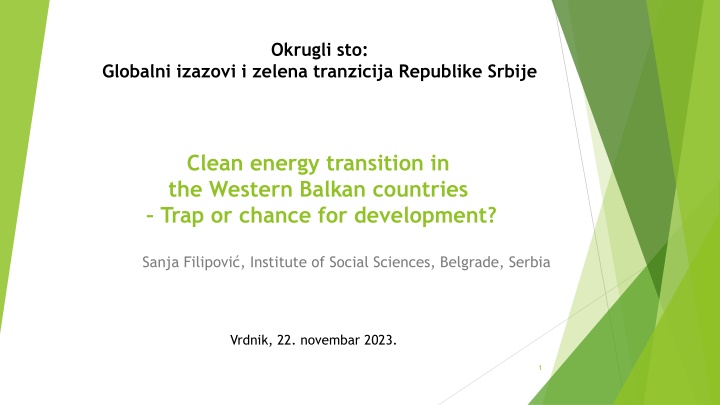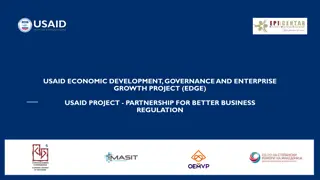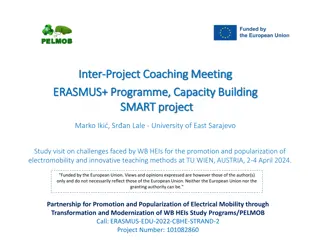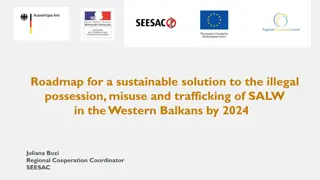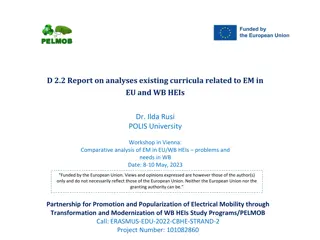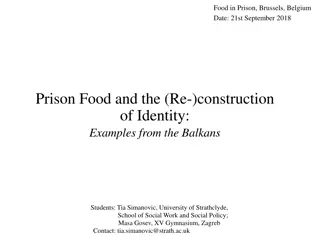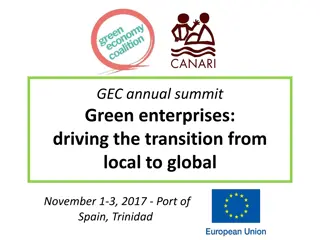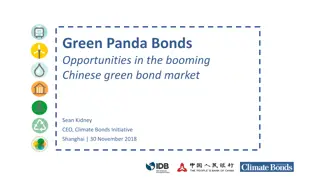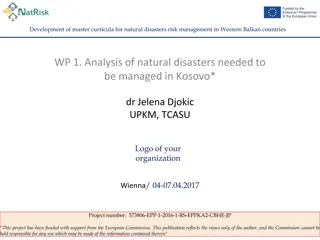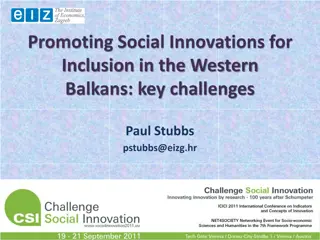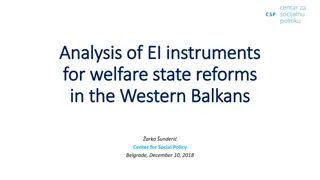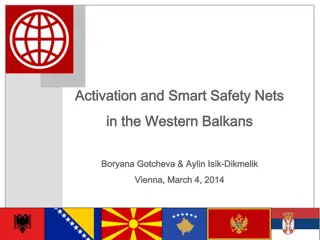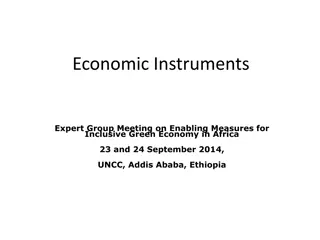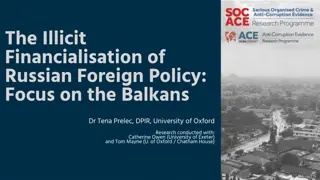Green Transition and Economic Development in the Western Balkans
The European Union's commitment to reducing greenhouse gases presents both challenges and opportunities for countries in the Western Balkans. The Green Agenda for the region outlines key areas for sustainable development, supported by significant EU investment. Transitioning to clean energy and addressing climate issues are crucial components for future growth and competitiveness in the region.
Download Presentation

Please find below an Image/Link to download the presentation.
The content on the website is provided AS IS for your information and personal use only. It may not be sold, licensed, or shared on other websites without obtaining consent from the author.If you encounter any issues during the download, it is possible that the publisher has removed the file from their server.
You are allowed to download the files provided on this website for personal or commercial use, subject to the condition that they are used lawfully. All files are the property of their respective owners.
The content on the website is provided AS IS for your information and personal use only. It may not be sold, licensed, or shared on other websites without obtaining consent from the author.
E N D
Presentation Transcript
Okrugli sto: Globalni izazovi i zelena tranzicija Republike Srbije Clean energy transition in the Western Balkan countries Trap or chance for development? Sanja Filipovi , Institute of Social Sciences, Belgrade, Serbia Vrdnik, 22. novembar 2023. 1
Green transition The European Union is implementing the energy transition with a commitment to reduce greenhouse gases for 55% by 2030 compared to 1990. The European Union defined carbon neutralisation as a strategic goal within the Green Deal, a long-term development strategy adopted in December 2019. First, the Investment Plan was defined, which specifies the financial framework, financial mechanisms and financial institutions that will be involved in the implementation process of the Green Deal. Second, the Climate Law was adopted as the first European Climate Law and in that way climate neutrality became obligatory for member states. In July 2021, the European Commission adopted a regulatory framework ("fit for 55 package"). 2
Electricity net generation capacity (MW) and net generation (TWh), % of total 3 Source: IEA
In February 2023, residential electricity prices including taxes in the EU varied from 9.2 euro cents per kilowatt hour (c /kWh) in Hungary to 49.9 c /kWh in Ireland. 5
Number of employees in mines, TPPs and indirect jobs Mining jobs Overall jobs Indirect jobs Power plant jobs 14,472 2,466 16,938 13,250 Bosnia and Herzegovina Serbia Kosovo* North Macedonia 12,331 3,249 2,980 2,931 1,482 678 15,262 4,731 3,658 37,708 4,967 3,927 Montenegro Total 750 33,782 171 7,728 921 41,510 1,061 60,914 6
The Green Agenda for the Western Balkans The Green Agenda for the Western Balkans was adopted at the Summit of the region's leaders in November 2020 in Sofia. The European Union is ready to invest EUR 9 billion from it s budget through the Instruments for Pre-Accession Assistance (IPA III) for the period 2021-2027. The funds are intended to support the development of competition, sustainable growth, green and digital transition. Key areas of intervention: 1. Climate, energy and mobility; 2. Circular economy; 3. Reduction of pollution (air, water and soil); 4. Sustainable agriculture and food production; 5. Biodiversity. 7
The required actions for the Western Balkan Alignment with the European Climate Law with a vision of achieving climate neutrality by 2050; Setting energy and climate change targets by 2030 in line with the Energy Community framework and the EU acquis, as well as developing and implementing integrated energy and climate plans with clear measures designed to reduce greenhouse gas emissions for all relevant sector policies; Continue alignment with the EU Emissions Trading Scheme, as well as work on the introduction of other carbon pricing instruments to promote decarbonisation in the region; Prioritizing energy efficiency and improvement in all sectors; Increasing the share of renewable energy sources and providing the necessary conditions for investment, in line with the EU and the objectives of the Energy Community; Integrating the Western Balkans into the EU's industrial supply chains through decisive action to improve the sustainability of primary raw material production, etc. 8
Conclusion The Green Agenda might be a development opportunity for the Western Balkans due to it promotes the integration into the EU supply chain, set up of sustainable agriculture and food production and complete reduction of pollution, that will raise the quality of life and health of its citizens. On the other hand, energy transition is higly demanding for the region due to characteristics of its electricity sector. There are a numerous obstacles for implementation of the Green Deal: the region sees the removal of coal subsidies as a major hit to the existing power industry and mines, which can cause serious socio-economic problems, the lack of capacity for long-term planning and writing projects for IPA funding, the lack of intersetor cooperation at the governmental level, the process of public reform has not completed yet, etc. 9
